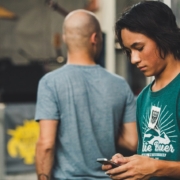Social Media Part 7: Wrap up: What Can We Do?
During the pandemic, we have all realized the need for face to face connection and how a lack of can take a toll on our mental health. Connection has shown to be the color in our lives. We need it!
Our phones have turned into our companions. A constant in our lives we reach for when we are lonely, bored, seek entertainment, and even as a way to avoid engaging with others. As with any friend, we need to evaluate whether they are good for us. So when it comes to social media use, take inventory.
Take inventory of what you expose yourself to on social media and how you think it impacts you. Ask yourself; Do I spend more time living in someone else’s world instead of my own? Who am I caught up following and why? Is my time spent comparing myself to others? Is my need for belonging being satisfied or taking a hit? Is my curiosity running my use causing me to spend endless hours surfing? What is the voice inside my head saying after use? AND how does it leave me feeling?
For parents:
It is harder than ever to be a teen and young adult. The world is full of chaos and noise right now. It is difficult to maneuver through the noise and just be a teen.
The bar is set so high in all aspects of their life. Making it feel like they have to compete at such a high level. It’s not a 4.0 anymore, it’s a 4.4. It’s not just being a good student, it’s, are you well rounded? Do you have internships and volunteer positions? Are you doing it all? The pressure is insurmountable. The bar is somewhere in clouds never able to really know where it is and when you’ve reached it. We think social media is a way to unwind or have down time. But it’s just another place where they see they aren’t measuring up, not reaching the bar.
If you are a parent, talk with your young adult about pressures and tendencies to compare themselves to others. Let them know they don’t have to partake in the race to the unknown finish line.
Talk with them about increases of anxiety, depression, and loneliness that can come from social media use. And that when we are down, we tend to isolate and social media use tends to increase. This upturn in use during difficult times can cause one to feel worse. A downward spiral that can be hard to recover from.
Help them instead of punishing them.
Help them filter their feed, finding positive things to look at instead of things that make them feel bad.
Don’t minimize their need to connect with their friends but help them find ways they can connect in person. Talk with them about using it to build upon their relationships not be the only avenue for their relationships.
Weekly I will ask my clients to take a break from social media for a day or two. Just to see how they feel. Without fail they tell me they feel better, more free, less anxious, less down, and engaged in more pleasurable activities. They report feeling better about themselves. Talk with your young adult about taking a day away from social media.
Actually, we should all give it a try!







